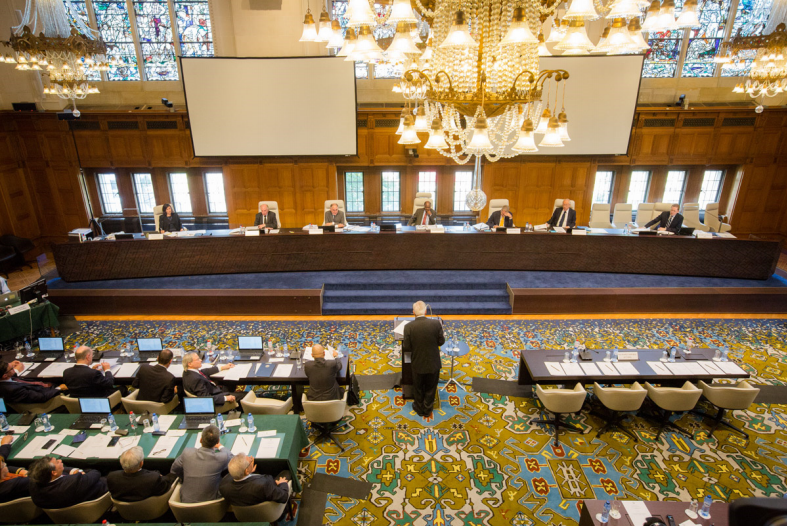
Hearing on Jurisdiction and Admissibility in session, July 2015, Peace Palace, The Hague. Philippine Secretary for Foreign Affairs, Albert F. Del Rosario (center) addressing the Arbitral Tribunal. China’s table (right) is empty as they have declined to participate in the proceedings.
On Tuesday, an international tribunal in The Hague ruled that China’s expansive claim to sovereignty over waters in the South China Sea had no legal basis. The case was brought to the court by Manila in January 2013, following the occupation by China of the Scarborough Shoal in 2012, after both sides had agreed to pull back following an agreement brokered by Washington.
The Hague’s ruling was widely expected to find in favor of Manila, and the unanimous decision declared China’s so-called nine-dash line, or ‘cow’s tongue’, which claims some 80 to 90% of the South China Sea, did not comport with the United Nations Convention on the Law of the Sea (UNCLOS).
The court also ruled the maritime features occupied by China were rocks, low tide elevations, or submerged banks and thus could not claim the waters around them. The court also declared there was “no legal basis for China to claim historic rights to resources” as China had never exercised exclusive authority over the waters. Finally, the tribunal also accused Beijing of interference with fishing and oil exploration, “severe harm to the coral reef environment” and of its failure to prevent Chinese fishermen from harvesting endangered sea turtles and other species “on a substantial scale.”
China’s Foreign Ministry issued a statement following the verdict, arguing “The award is invalid and has no binding force,” and adding “China does not accept or recognize it.” While Beijing has long pledged not to honor the verdict (in expectation of losing), and there is no enforcement mechanism behind the ruling, nonetheless the tribunal’s ruling is significant for three reasons.
First, it is the first time Beijing has been summoned before an international court of law, and despite Beijing claiming the court has no jurisdiction over the case, Beijing did seek to influence the decision by submitting a nota verbale to the court arguing for bilateral negotiations with the Philippines, and by lobbying other countries to support its position ahead of the ruling.
Second, the ruling encourages other claimants to maritime features in the South China Sea to pursue their claims through the court. Thirdly, the ruling may embolden the Philippines and their ally, the United States, to further Manila’s claims to the disputed features.
With such a loss of face for Xi Jinping, South China sea watchers fear Beijing will react with a show of force, either by taking control of Second Thomas Shoal, another shoal claimed by the Philippines, upon which a handful of Filipino troops are based on a grounded old warship. Or Beijing could restart efforts at building an island on Scarborough Shoal. Another softer option for Beijing is the declaration of another air defense identification zone (ADIZ) over the South China Sea, to complement its ADIZ in the East China Sea.
Each of these options to save face has its risks, especially reclaiming efforts on Scarborough Shoal, which the U.S. and the Philippines have suggested represents a red line to be prevented with force. Given the number of U.S. Navy ships patrolling the waters, and the new leadership in Manila who are willing to negotiate bilaterally with Beijing, the first two options are unlikely. Should Beijing declare a new ADIZ, the Pentagon will likely respond by immediately flying its hardware through the ADIZ, and the waters will be calm for a while, while we all await Beijing’s next move.